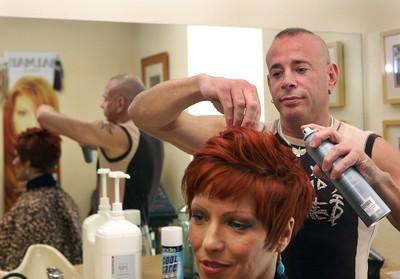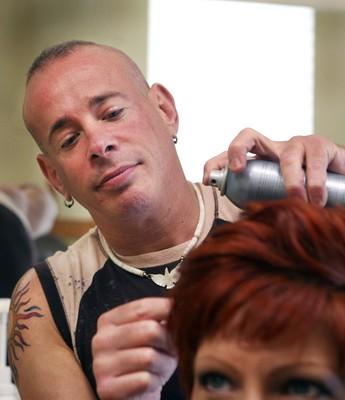Clips, snips, break for tips
WASHINGTON -- Tips to hairdressers must be reported to the Internal Revenue Service, and Rep. Shelley Berkley, D-Nev., wants employers of cosmetologists to get a tax break for keeping accurate records of tip income.
Last month, Berkley introduced the Small Business Tax Equalization and Compliance Act, which is patterned after agreements between the IRS and tip-driven industries such as restaurants and casinos.
"We'd like to provide a tax credit to the salon owners for doing all of this extra paperwork and ensuring that we get the proper amount of reporting -- the right numbers -- from the cosmetologists," Berkley said.
Berkley's bill is similar to the tip-tax agreement between Nevada casinos and the IRS.
Casinos report tip income of their employees, and the IRS agrees not to audit tax returns of bartenders, cocktail waitresses and other casino workers.
But perhaps a better comparison is the agreement between the restaurant industry and the IRS.
In return for data on tip income of their employees, restaurant owners receive a tax break.
Under current rules, hairdressers and cosmetologists report tips based on whether they're salon employees or independent contractors.
Employees must either fill out a monthly tip sheet stating their gratuities, or decline reporting tips and have the IRS assume an 8 percent standard tip rate.
Independent contractors don't have to file tip sheets, and they're not subject to standard tip calculations. But they are, unlike most employees, at risk of an IRS audit.
The majority of hairdressers and cosmetologists are independent contractors. At Euphoria Day Spas, for example, about 90 percent of the company's 600 workers valleywide are independent contractors, company President Donna Catalfamo said.
Industry workers in Nevada largely seem to support Berkley's proposal.
David Austin, a cosmetologist with Euphoria Day Spa at 1381 W. Sunset Road in Henderson, said he loved the idea.
The IRS audited Austin two years in a row about a decade ago after he applied for a home loan.
The experience was bad enough that Austin, a past chairman and current board member of the Nevada State Board of Cosmetology, switched his status from independent contractor to employee.
"Having gone through that, I personally think (Berkley's plan) is terrific," said Austin, who stressed that he wasn't speaking on the state board's behalf. "It puts your mind at ease to not have to worry about the hassle."
The rule could also make bookkeeping easier, Austin said, because beauty workers likely wouldn't have to keep explicit details on beauty-supply purchases and other expenses for potential audits. The reduction in red tape would in turn give them more time to work.
Catalfamo praised the proposal as well.
"It will give technicians something to be in compliance with," she said. "They'll have some kind of structure and have to worry less about audits."
Bonnie Schultz, owner of the International Academy of Style in Reno, also said the rule could have benefits.
"Whenever you say to someone, 'For being honest, you get rewarded,' I think that's a great thing," Schultz said.
"The agreement between the casinos and the IRS does not involve Congress; it's just between them," said Frank Zona, who owns a salon near Boston. "We're not asking Congress to change the tax code. We're asking Congress to extend it to cover cosmetologists as well as restaurants."
Zona is a former president of the Professional Beauty Association, a trade group that represents salon owners.
By complying with the tip-tax reporting requirement, Zona said his salon is at a competitive disadvantage in hiring new employees.
"I would say upward of 70 percent, maybe 80 percent of cosmetologists, are self-employed because they don't want to be burdened with keeping records of tips received by their employees," Zona said.
If Berkley's bill becomes law, a salon owner could receive a tax break of almost $2,000 for reporting $25,000 in tips to the IRS.
Zona estimates he could receive an annual tax credit of about $8,000.
"That would allow me to offer benefits like a dental plan to new employees, which would make me more competitive in hiring," Zona said.
So far, Berkley's bill has 16 co-sponsors, including a bipartisan group of five women -- Reps. Diana DeGette, D-Colo.; Kay Granger, R-Texas; Zoe Lofgren, D-Calif.; Carolyn McCarthy, D-N.Y. and Marilyn Musgrave, R-Colo.
Frank Fahrenkopf, president of the American Gaming Association, and Pilar Weiss, the political director for Culinary Local 226 in Las Vegas, said they do not see any conflict between Berkley's bill and the casino industry's tip-tax agreement with the IRS.
Nevada beauty professionals had one caveat regarding the policy: They'd like regulators to make sure any new policy doesn't set tip-reporting levels too high, because consumers dole out gratuities unevenly. Some hairdressers and cosmetologists might feel they're claiming more in tips than they're actually receiving, Austin said.
Added Schultz: "It's just like casino workers: Some people have personality and some don't. People can end up sharing their tips with someone who doesn't smile."


















